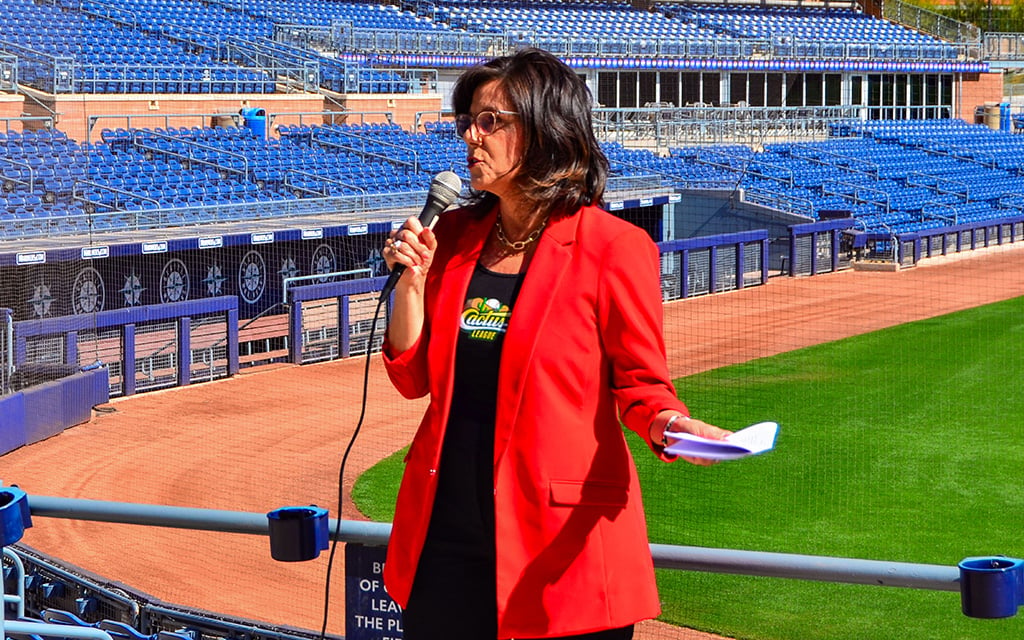PEORIA – To trace the success of this spring’s Cactus League, look no further back than the 2023 World Series, when the Texas Rangers blanked the Arizona Diamondbacks, 5-0, in Game 5 at Chase Field to win the championship.
Fast forwarding from the Fall Classic, the residual effects produced one of the best fan turnouts at spring training since 2019, with hordes of people flocking to Arizona to get the first look at the reigning World Series champions, the runner-up and, of course, Shohei Ohtani, Major League Baseball’s biggest star.
Cactus League executive director Bridget Binsbacher announced that 1,630,436 attendees across the league’s 216 games marked the most since before the pandemic, an increase of over 65,000 fans from last year. For the 11th straight season, the Chicago Cubs topped attendance as Sloan Park’s 10th season saw a total of 241,215 baseball fans walk through the turnstiles throughout the spring.
“Cactus League attendance is climbing steadily after three seasons disrupted by the pandemic and a labor stoppage,” Binsbacher said Thursday. “Because six out of 10 Cactus League fans come from out of state, attendance is a reliable barometer of spring training’s substantial impact on Arizona tourism.
“We thank the visitors and residents who came out in droves this spring – and we look forward to welcoming them back next year for baseball in the desert sunshine.”
For three years, from 2020-2022, the Arizona Cactus League couldn’t operate normally because of two years of COVID restrictions while 2022 saw MLB enter a lockout that didn’t end until March 10, cutting the spring season in half.
The defending World Series champion Rangers, playing at Surprise Stadium in the west Valley, experienced a gigantic 42.3% increase in attendance this spring training, up to an average of 7,548 fans per game. Meanwhile, over at Salt River Fields in Scottsdale, the National League pennant winners and hometown Diamondbacks saw a 16.6% increase, up to 11,099 fans per game.
“The energy that happened with the Texas Rangers was a direct result of what happened in the postseason, and then being World Series Champions,” Binsbacher said. “They’re an out-of-state team, so we knew that was going to create additional tourism and more fans in their stadium. The numbers absolutely support what we projected.
“I think Surprise, like any of our cities, was ready for that. The good thing is these teams are in 10 facilities across the Valley, so it doesn’t just impact one city. It’s a win for all of us. It’s a win for all of Arizona.”
Meanwhile, superstar two-way player Ohtani’s move from the Los Angeles Angels to the Los Angeles Dodgers transferred the large Japanese contingent of fans who follow Ohtani from the Angels’ facility in Tempe to the Dodgers’ Camelback Ranch facility in Glendale. The Dodgers also added Japanese star right-handed pitcher Yoshinobu Yamamoto, increasing the fervor even further.
As a result, the team saw an increase in attendance of 19.8%, drawing 11,058 fans per game during spring training. However, the Dodgers played a camp-low 12 home games in Glendale due to a couple of circumstances that affected the Cactus League’s overall attendance for 2024.
Usually, a team plays around 30 spring training games, split between home and road games during the exhibition season. The Dodgers and the Padres’ spring seasons were cut short as they traveled to Seoul, Korea, to play in the Seoul Series, giving MLB fans in Korea a chance to see two official MLB regular-season games.
The Dodgers and Padres played their final Cactus League games on March 13, while the rest of the league played games in Arizona until at least March 24.
“The Dodgers are one of the most popular teams, Ohtani, one of the most popular players,” Binsbacher said. “We knew (the Seoul Series) was going to have a tremendous impact on the season. They cut their season short on March 13, and their numbers to March 13 were just about what they were the previous season, so we know it would have been big. It’s another factor that we just can’t control, but yet it still continues to grow and grow.”
Another factor that the league couldn’t control was the weather, which at times did not cooperate. Binsbacher mentioned that this year’s 10 rainouts were the most she could recall. Since spring training games are not rescheduled, the Cactus League lost an estimated 75,000 fans towards its total attendance, assuming those 10 games matched the average of 7,548 fans per game.
The Cactus League serves as one of Arizona’s most prominent tourist attractions. A study by the WP Carey School of Business at ASU found that six out of every 10 Cactus League attendees come from out of state. In 2023, the league’s first full season after the pandemic and lockout resulted in $710.2 million in total economic activity, and it resulted in $418.5 million towards Arizona’s gross domestic product.
“I think we’re going to continue to grow and move the right direction, and we expect more and more fans to come to Arizona to experience spring training,” Binsbacher said. “What we do know is that there are things that are out of our control from season to season that are a given, so we just make the most of the opportunity that we have here with Major League Baseball.
“It only happens (in) two places in the country, Arizona and Florida. And we’re … thrilled to have it here.”



